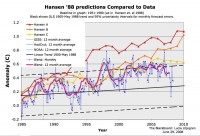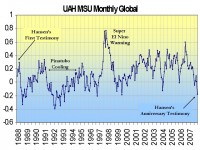By Geoff Brumfiel in Nature
James Hansen, the director of NASA’s Goddard Institute for Space Studies in New York City, is well known for rattling his nation’s political establishment. This week, the climate scientist was in London, UK, to testify on behalf of activists who defaced a coal-fired power station in Kent. Geoff Brumfiel caught up with Hansen at a London hotel to find out what has got him all hot and bothered.
Why did you come to testify?
Nothing could be more central to the problem we face with global climate change. If you look at the size of the oil, gas and coal reservoirs you’ll see that the oil and gas have enough CO2 to bring us up to a dangerous level of greenhouse gases in the atmosphere. There’s a potential to solve that problem if we phase out coal. If we were to have a moratorium on coal-fired power plants within the next few years, and then phase out the existing ones between 2010 and 2030, then CO2 would peak at something between 400 and 425 parts per million. That leaves a difficult problem, but one that you can solve.
Do you think that leaders like UK Prime Minister Gordon Brown have lived up to their promises on climate change?
It depends on whether they will have a moratorium on coal-fired power. I think that the greenest leaders, like German chancellor Angela Merkel and Prime Minister Brown, are saying the right words. But if you look at their actions, emissions are continuing to increase. All of these countries and the United States are planning to build more coal-fired power plants. And if you build more coal-fired power plants, then it is not possible to achieve the goals that they say they are committed to. It’s a really simple argument and yet they won’t face up to it.
So do you think that these activists were justified in doing what they did?
The activists drawing attention to the issue seems to me as justified. You should try to do things through the democratic process, but we really are getting to an emergency situation. We can’t continue to build more coal-fired power plants that do not capture CO2 if we hope to solve the problem.
We need to get energy from somewhere. So if we’re not getting it from coal, then where?
The first thing we should do is focus on energy efficiency. The fact that utilities make more money by selling more energy is a big problem. We have to change those rules. Then there is renewable energy — in order to be able to fully exploit renewable energy, we need better electric grids. So those should be the first things, but I think that we also need to look at next-generation nuclear power.
Some have said you are hypocritical for flying all the way from the US to the UK just to testify. How do you respond?
I like to travel as little as possible, not only because it uses less CO2 but because I prefer to do science. But sometimes there are things which are sufficiently important that I think it makes sense.
What do you think the roll of the scientist should be in the broader societal debate on climate change?
I think it would be irresponsible not to speak out. There is a clear gap between what is understood by the relevant scientific community and what is known by the public, and we have to try and close that gap. If we don’t do something in the very near future, we’re going to create a situation for our children and grandchildren that is out of control.
Icecap Note:
Reality versus Hansen’s 1988 climate models. Yelllow line is holding CO2 constant at 1988 levels. Obviously not the case. Blue lines show actual temperatures. image courtesy Lucia at the Blackboard.

See larger image here
Temperatures 20 years after Hansen’s infamous congressional testimony.

See larger image here
Also Hansen has predicted 60 foot sea level rise this century the last year. See how sea levels are behaving here.
BBC
The Environment Minister Sammy Wilson has angered green campaigners by describing their view on climate change as a “hysterical psuedo-religion”. In an article in the News Letter, Mr Wilson said he believed it occurred naturally and was not man-made. “Resources should be used to adapt to the consequences of climate change, rather than King Canute-style vainly trying to stop it,” said the minister.
Peter Doran of the Green Party said it was a “deeply irresponsible message.” Mr Wilson said he refused to “blindly accept” the need to make significant changes to the economy to stop climate change. “The tactic used by the “green gang” is to label anyone who dares disagree with their view of climate change as some kind of nutcase who denies scientific fact,” he said.
The minister said he accepted climate change can occur, but does not believe the cause has been identified. “Reasoned debate must replace the scaremongering of the green climate alarmists.” John Woods of Friends of the Earth said Mr Wilson was “like a cigarette salesman denying that smoking causes cancer”. “Ironically, if we listen to him Northern Ireland will suffer economically as we are left behind by smarter regions who are embracing the low carbon economy of the future.”
It is the latest clash between Mr Wilson and green groups since his appointment as environment minister in June. See earlier story here. In it he said the following:
“I am not convinced and I don’t think that there is any firm evidence to show that all of that climate change is due to CO2 emmissions,” Mr Wilson said.
Some environmental groups have criticised Mr Wilson’s appointment.
However, Mr Wilson said he would do a good job.
“As minister for the environment I’ve got a duty to ensure that there’s a good balance set between the need to develop our economy, to provide homes, factories, roads etc and at the same time to protect the environment.
“I think we have to make sure we do not allow the agenda for NI to be dominated by the people who can sometimes be described as green fanatics,” he said.
By Britt Weygandt, Executive Director, Western Business Roundtable
Did you see this recent Associated Press story entitled, ”U.S. on verge of grand-scale blackout”?
Contrast this dire assessment by technical experts with what one sees playing out in political arenas across the West:
(1) Activist groups are working to slow or stop the completion of the two main multi-year, stakeholder-based transmission corridor processes that both Democrats and Republicans in Congress approved as part of the Energy Policy Act of 2005;
(2) Activist groups are working to slow or stop completion of public lands infrastructure corridors that both Democrats and Republicans in Congress approved in 2005;
(3) Activist groups are suing to block the construction of virtually every single baseload coal-fired power plant, in spite of advanced environmental technologies these plants would deploy;
(4) Activist groups are threatening to begin suing to block the construction of natural gas-fired power plants;
(5) Activist groups continue to block expansion of new baseload hydropower facilities in the West;
(6) Activist groups are gearing up to block construction of any baseload nuclear power plants across the West;
(7) Activist groups are pressuring government leaders to limit access by larger, baseload technologies to the region’s high-voltage transmission grid and instead to artificially favor non-baseload, intermittent power facilities that will (at some point) further stress the reliability of the entire Western grid;
(8) Activist groups, and their supporters in Congress, are pushing for a massive expansion of federal wilderness and other restrictive public land designations that would severely limit the ability to plan and implement the large-scale transmission necessary to support the Western grid.
Many Governors across the West have been trailblazing leaders in pushing for greater investment in new, high-voltage transmission lines. Yet the Western Governors’ Association is focusing its energy on discussing “renewable energy zones” instead of pushing for resource-independent transmission. While such zones are a laudable idea, they don’t address the fundamental challenge of keeping the lights on in the West.
Moreover, WGA has placed groups like the Sierra Club and the Wilderness Society in key leadership positions in their energy infrastructure planning processes. These are among the same groups that often sue to slow or stop virtually every major proposed electric transmission line or baseload power facility.
It is critically important that the West re-focus on the fundamental issue here: we have a long way to go to catch up on our backbone electricity infrastructure, and a shrinking window in which to get there. Failure is simply not an option. People lose their lives when the lights go out.
That is why we are convening a regional summit this November called “Keeping the Lights On In The West - Averting Economic Disaster and Saving Lives.” This summit will feature some of the nation’s leading thinkers on how we can strengthen our nation’s energy grid. It will focus on real solutions - not overheated rhetoric. See full release here.


